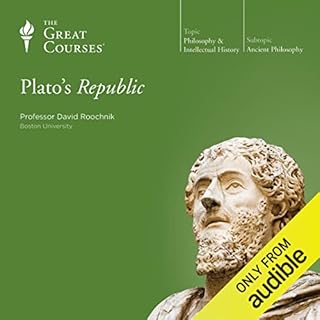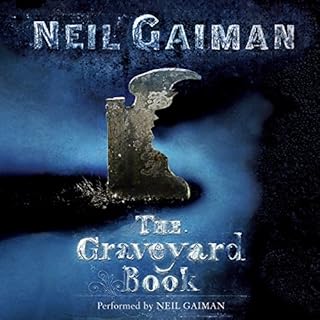J.B.
- 433
- opiniones
- 2,485
- votos útiles
- 440
- calificaciones

-
Anna Karenina
- De: Leo Tolstoy
- Narrado por: Nadia May
- Duración: 33 h y 35 m
- Versión completa
-
General4 out of 5 stars 980
-
Narración:4 out of 5 stars 435
-
Historia4 out of 5 stars 439
Considered by some to be the world's greatest novel, Anna Karenina contains two plots: the tragedy of Madame Karenina, in love with a man who is not her husband; and the story of Konstantine Levin, a sensitive man whose personal philosophy is Tolstoy's reason for writing about him.
-
5 out of 5 stars
-
A classic, classically read
- De D. Littman en 07-04-05
- Anna Karenina
- De: Leo Tolstoy
- Narrado por: Nadia May
Tolstoy's Guide 0n How to Manage One's Matrimony
Revisado: 02-19-25
Anna is a sophisticated woman who abandons her empty existence as Karenin's wife and turns to Count Vronsky to fulfill her passionate nature—with tragic consequences. Her story is juxtaposed with the origin and maturation of a then-contemporary relationship between Konstantin Levin, a landowner/farmer, and his adored Ekaterina (Kitty), a girl less demanding than Anna. Anna's relationship is based in passion, the Kitty relationship is based on rapport. The story is a study of morality between lovers. Anna Karenina by Leo Tolstoy and superbly read by Nadia May.
Se ha producido un error. Vuelve a intentarlo dentro de unos minutos.
Has calificado esta reseña.
Reportaste esta reseña
-
A Gentleman in Moscow
- A Novel
- De: Amor Towles
- Narrado por: Nicholas Guy Smith
- Duración: 17 h y 52 m
- Versión completa
-
General4.5 out of 5 stars 45,838
-
Narración:5 out of 5 stars 41,474
-
Historia4.5 out of 5 stars 41,303
In 1922, Count Alexander Rostov is deemed an unrepentant aristocrat by a Bolshevik tribunal, and is sentenced to house arrest in the Metropol, a grand hotel across the street from the Kremlin. Rostov, an indomitable man of erudition and wit, has never worked a day in his life, and must now live in an attic room while some of the most tumultuous decades in Russian history are unfolding outside the hotel’s doors. Unexpectedly, his reduced circumstances provide him entry into a much larger world of emotional discovery.
-
5 out of 5 stars
-
A Reprieve Amidst Ugly News, Relentless Negativity
- De Cathy Lindhorst en 08-27-17
- A Gentleman in Moscow
- A Novel
- De: Amor Towles
- Narrado por: Nicholas Guy Smith
Extracting Oneself Into Life
Revisado: 02-16-25
This is a fabricated tale of a Romanoff Count, Alexander Ilyich Rostov, prosecuted by the progenitor Bolsheviks and punished for his heritage. His extraordinary sentence, to which he is imprisoned, limits his existence to life spent at the Metropol Hotel, in Moscow. Russia's finest hotel. He is limited to the internal building. Such is the setting for A Gentleman in Moscow, by Amor Towles.
Using vignettes, the book tells the story of this absurd incarceration over the ensuing thirty years. Our hero, as we come to understand, is a refined European gentleman and each episode (book chapter) teaches us of and plays off his elegance, sophistication, and grace. One falls in love with his propriety, and the surrounding circumstances of the author Towle's plot for the book. The story is intriguing, but the book is exciting because of its ultimate plot, which has our Count, after thirty years, pull off a complicated extraction of himself and a beloved out of harm’s way.
If you ask me whether I would recommend the book, I can explain myself best by saying that reading ‘A Gentleman,’ will be one of my happiness in life,
Se ha producido un error. Vuelve a intentarlo dentro de unos minutos.
Has calificado esta reseña.
Reportaste esta reseña
-
Plato's Republic
- De: The Great Courses, David Roochnik
- Narrado por: Professor David Roochnik Ph.D. Pennsylvania State University
- Duración: 12 h y 14 m
- Grabación Original
-
General4.5 out of 5 stars 887
-
Narración:4.5 out of 5 stars 771
-
Historia4.5 out of 5 stars 765
More than 2,000 years later, Plato's Republic remains astonishingly relevant to our everyday lives. It poses one question after another that might well have been drawn from the headlines and debates of our nation's recent history: What sort of person should rule the state? Are all citizens equal before the law? Should everyone have equal access to health care? Plato's greater inquiry, however, was into the question of defining justice itself and the reasons why a person would choose a life aligned with that virtue.
-
5 out of 5 stars
-
Teaches how to think not what to think!
- De Gary en 07-11-18
Difficult to Fathom, But Worth the Effort
Revisado: 08-06-24
This review speaks to Plato's Republic, by The Great Courses, contributing professor, David Roochnik, Series: The Great Courses: Ancient Philosophy. Taking the course, of course, is distinct from reading the publication, The Republic itself. To enjoy the taught course, though, one would assume you will read a chapter in The Republic, and then listen to the professor’s comments on The Republic chapters you supposedly just read.
Reading The Republic is not an easy and not necessarily an enjoyable task. Its translated words do not make reading sense. Translators convert the ancient Greek literally, which does not effectively communicate to the reader what is being conceptualized. Who wants to nurture Plato’s chosen words? You ‘might’ get the gestalt of it all but certainly will not understand its every word, sentence, or paragraph. This makes for a horrible read, but there is so much thought to work through in The Republic, it makes the slough, that is the dialogue, well worthwhile. Most of all realize this about The Republic. It is often thought of as a compendium of types of government. That is a mirage. It is a psychological study of the personalities that affect government. The book is not political theory. It is about human psychology.
Professor Roochnik’s lectures will not give the reader a complete understanding of the work and its chapters but do provide food for thought. His form of speech thought is choppy and not a joy to listen to.
Se ha producido un error. Vuelve a intentarlo dentro de unos minutos.
Has calificado esta reseña.
Reportaste esta reseña
-
Frederick Douglass
- Prophet of Freedom
- De: David W. Blight
- Narrado por: Prentice Onayemi
- Duración: 36 h y 57 m
- Versión completa
-
General4.5 out of 5 stars 2,552
-
Narración:4.5 out of 5 stars 2,279
-
Historia4.5 out of 5 stars 2,266
As a young man, Frederick Douglass (1818-1895) escaped from slavery in Baltimore, Maryland. He was fortunate to have been taught to read by his slave owner mistress, and he would go on to become one of the major literary figures of his time. He wrote three versions of his autobiography over the course of his lifetime and published his own newspaper. His very existence gave the lie to slave owners: with dignity and great intelligence, he bore witness to the brutality of slavery.
-
4 out of 5 stars
-
The sound of rollerskating in sand
- De Rico X Ludovici en 02-06-19
- Frederick Douglass
- Prophet of Freedom
- De: David W. Blight
- Narrado por: Prentice Onayemi
A Lugubrious Read
Revisado: 06-30-24
A biography should not only take us into the biographed person’s life, achievements, and shortcomings but also tell us of the era in which the biographed subject lived. Knowing the era provides a measuring staff, a perspective from which to view the subject's acts and creations. For this book, that would be the pre-, contemporary, and post-Civil War period in America. This work by David W. Blight, narrated by Prentice Onayemi, provides such a backdrop to the story and does that well. The author, Blight, though, has two flaws in his writing; separate from the telling of the place of slavery in America, in the mid to late eighteenth century. Blight’s story merely indexes Douglass’ life, into notecards, of what happens, and then, sequentially, what happens next. He never tells the story of the inner man. We only see Douglass from an outer view of his history.
Second, the book constantly tells us of Douglass’ thoughts on a subject but never tells us what considerations generated those views. I think the author read Douglass’s speeches, to reach his understanding, but never ties the story into why a speech was created and to achieve what purpose. We never have data to determine whether Douglass was calculated or adrift.
Finally, the work is too solemnly read. I am not sure that is Onayemi’s fault, in that I believe he was working with a writing style that required his lugubrious tone. Yet, I recommend the read. The book does provide an understanding of the unfair burden put upon Black Americans—an injustice yet to be provided for in our present world. Douglass was a self-educated man who by luck and fortunate circumstances provided America and the world with an understanding of the evils slavery brought to the United States. It wasn’t until this read, that I learned he came nowhere close to his goal of making people understand there should be equality for the Black race. The read was worthwhile but didn’t knock my socks off.
Se ha producido un error. Vuelve a intentarlo dentro de unos minutos.
Has calificado esta reseña.
Reportaste esta reseña
-
Private
- De: James Patterson, Maxine Paetro
- Narrado por: Peter Hermann
- Duración: 7 h y 4 m
- Versión completa
-
General4 out of 5 stars 27,571
-
Narración:4.5 out of 5 stars 24,460
-
Historia4 out of 5 stars 24,425
Former Marine helicopter pilot Jack Morgan runs Private, a renowned investigation company with branches around the globe. It is where you go when you need maximum force and maximum discretion. The secrets of the most influential men and women on the planet come to Jack daily - and his staff of investigators uses the world's most advanced forensic tools to make and break their cases.
-
5 out of 5 stars
-
private
- De Meaghan Bynum en 07-01-10
- Private
- De: James Patterson, Maxine Paetro
- Narrado por: Peter Hermann
Just Awful
Revisado: 05-24-24
One could only be teased with anticipation, when picking up a crime novel, as in Private, by James Patterson, Maxine Paetro, and narrated by Peter Hermann, Series: Private, Book 1. I mean all that noir stuff makes dendrites titillate. Private is the reverse of your everyday good-to-read crime story.
The story takes place in a alleged super detective – worldwide - private detective agency homed in Los Angeles. The book tells the story of three ongoing crimes and the trials and tribulations of the emotionally ill-adjusted firm owner. The crime stories are told without analysis, the plots move along with no purpose, and our hero is a chauvinistic son of a gun (literally). Things happen without any basis for them to happen. The book and its stories were readable, but why bother?
Se ha producido un error. Vuelve a intentarlo dentro de unos minutos.
Has calificado esta reseña.
Reportaste esta reseña
-
Sea Power
- The History and Geopolitics of the World's Oceans
- De: Admiral James Stavridis USN - Ret.
- Narrado por: Marc Cashman
- Duración: 11 h y 1 m
- Versión completa
-
General4 out of 5 stars 439
-
Narración:4.5 out of 5 stars 383
-
Historia4 out of 5 stars 383
From the time of the Greeks and the Persians clashing in the Mediterranean, sea power has determined world power. To an extent that is often underappreciated, it still does. No one understands this better than Admiral Jim Stavridis. In Sea Power, Admiral Stavridis takes us with him on a tour of the world's oceans from the admiral's chair, showing us how the geography of the oceans has shaped the destinies of nations and how naval power has in a real sense made the world we live in today and will shape the world we live in tomorrow.
-
5 out of 5 stars
-
Highly Recommend. Brilliant, engaging & thoughtful
- De Francis Claro en 06-22-17
- Sea Power
- The History and Geopolitics of the World's Oceans
- De: Admiral James Stavridis USN - Ret.
- Narrado por: Marc Cashman
The Seven Seas and What They Mean to Us
Revisado: 05-19-24
If you want to know how the Navy, if not the whole Pentagon hierarchy, looks upon the world in aligning its responsibility in and for those waterways, this book, Sea Power, by Admiral James Stavridis, would be a proper place to start your understanding. The first half of the teaching begins with telling the commerce and war histories of each of the seven seas, and their tributaries. Admirable Stavridis, Managing Member of The Carlyle Group, Chairman of Rockefeller Trust, and much more, including morning commentaries on the day’s international affairs, on MSNBC, then overlays those historical foundations with power politics commentary on how to keep America at the center of world commerce and protect the United States as the world’s most elementary nation. He does all that and even throws in concerns (but no answers) on how to also maintain the viability of mankind.
The unfortunate part of the book is that it's only a good read and not an alluring read. I nevertheless, do recommend, you take up the read, if you think, thinking about sea power will make you a more insightful person.
Se ha producido un error. Vuelve a intentarlo dentro de unos minutos.
Has calificado esta reseña.
Reportaste esta reseña
-
The Mists of Avalon
- De: Marion Zimmer Bradley
- Narrado por: Davina Porter
- Duración: 50 h y 53 m
- Versión completa
-
General4.5 out of 5 stars 7,335
-
Narración:4.5 out of 5 stars 6,572
-
Historia4.5 out of 5 stars 6,577
A posthumous recipient of the World Fantasy Award for Lifetime Achievement, Marion Zimmer Bradley reinvented - and rejuvenated - the King Arthur mythos with her extraordinary Mists of Avalon series. In this epic work, Bradley follows the arc of the timeless tale from the perspective of its previously marginalized female characters: Celtic priestess Morgaine, Gwenhwyfar, and High Priestess Viviane.
-
5 out of 5 stars
-
Davina Porter brings an old favorite back to life!
- De Carolina en 07-13-12
- The Mists of Avalon
- De: Marion Zimmer Bradley
- Narrado por: Davina Porter
Good entertainment; serious thoughts to consider
Revisado: 05-08-24
The Mists of Avalon, written by Marion Zimmer Bradley, was very nicely narrated by Davina Porter. All four books were provided in this 50-plus-hour recording. The tale is a true harlequin novel, in that its plot is focused on or concerned with the heroine, that being mostly Morgaine, and her emotions and romances. This book, or rather this set of books, provides a full field of allegories to provide deep consideration of religion and womanhood. I think I come away from this read with a better understanding of each, as an element of human existence.
The storyline is set in Arthurian times, in about the 500 years of Britain. It is told singularly from a woman’s perspective. In addition to confronting a woman’s proper status in this and any society, the story also considers the challenge between the homeland’s traditional religion, a Druid following (obedience to the environmental forces), versus the newly introduced catholic regimen of obedience to the one God, the god of the New Testament. The opportunity to read the Arthurian saga from a woman’s eyes and the commonplace struggle between religions was superbly presented. The considerations to ponder were intriguing, and those two factors alone make the work well worth the read.
There are two major disappointments thought in the story. Bradley’s characters act erratically, and we are left wondering why they took such inane undertakings. A bit frustrating. The second disappointment is that when the author retells a character’s dreams or insight into the future, of which there were many such states of fantasy, she takes on a mystical form of writing, which I found vacuous and frustrating. Yet, when Bradley tells of the everyday story of earth-bound interaction, she does keep the reader involved and interested.
Se ha producido un error. Vuelve a intentarlo dentro de unos minutos.
Has calificado esta reseña.
Reportaste esta reseña
-
The Graveyard Book
- De: Neil Gaiman
- Narrado por: Neil Gaiman
- Duración: 7 h y 43 m
- Versión completa
-
General4.5 out of 5 stars 17,854
-
Narración:5 out of 5 stars 13,639
-
Historia4.5 out of 5 stars 13,632
Nobody Owens is an unusual boy who inhabits an unusual place - he's the only living resident of a graveyard. Raised from infancy by the ghosts, werewolves, and other cemetery denizens, Bod has learned the antiquated customs of his guardians' time as well as their ghostly teachings - such as the ability to Fade so mere mortals cannot see him.
-
5 out of 5 stars
-
Masterful Fantasy for the Jaded Heart
- De Guillermo en 10-12-09
- The Graveyard Book
- De: Neil Gaiman
- Narrado por: Neil Gaiman
Readable But Not a Necessary Book
Revisado: 03-27-24
This is a story about a boy temporarily taken in and cared for by the dead interned members of an old graveyard. There was reason for the extraordinary situation and therein lies the tale of the novel. The hidden reason. The Graveyard Book, written and narrated by Neil Gaiman, was not enthralled by any unique or involving storyline but was acceptable as a read to allow one time to drift in the ether. For a moment, while taking in the tale, I began to think about the story as practical. But I was able to rationalize my absurdity and just enjoyed the mildly pleasant read.
The structure of the story is to tell episodes of our hero, Nobody Owens, each such episode revealing some new magic-type trait he has because of the acceptance of his presence with the dead. Each one of these traits would be later used for the story’s finale, the overcoming of the designated evil forces. A somewhat pleasurable read, but a book that can be bypassed without much loss in literary ventures.
Se ha producido un error. Vuelve a intentarlo dentro de unos minutos.
Has calificado esta reseña.
Reportaste esta reseña
-
American Gods: The Tenth Anniversary Edition (A Full Cast Production)
- De: Neil Gaiman
- Narrado por: Ron McLarty, Daniel Oreskes, full cast
- Duración: 19 h y 39 m
- Versión completa
-
General4.5 out of 5 stars 62,613
-
Narración:5 out of 5 stars 57,158
-
Historia4.5 out of 5 stars 57,076
Locked behind bars for three years, Shadow did his time, quietly waiting for the day when he could return to Eagle Point, Indiana. A man no longer scared of what tomorrow might bring, all he wanted was to be with Laura, the wife he deeply loved, and start a new life. But just days before his release, Laura and Shadow's best friend are killed in an accident. With his life in pieces and nothing to keep him tethered, Shadow accepts a job from a beguiling stranger he meets on the way home, an enigmatic man who calls himself Mr. Wednesday.
-
5 out of 5 stars
-
New to Neil
- De Michael en 07-27-11
The Need to be . . . .Recognized
Revisado: 03-20-24
I am not attracted to books that entangle you with spooky things that transact beyond the realm of physics, particularly when there is no explanation of how those laws of quantum mechanics are being transgressed. Take note of the word spooky, it is being used here to separate scary stories from Greek tragedy and other myths, such as those concerning King Arthur, that I love to read, because they do not spook, but rather teach ethics.
So, one would expect me to dislike American Gods: The Tenth Anniversary Edition (A Full Cast Production), by Neil Gaiman. The story is the tale of spooks. But I read through (listened to) the novel (play) with glee. That’s because 1) as the reader you had no idea what you were reading about, 2) and yet, Gaiman, planted within the reader a thirst to know what the hell the story was telling us about. Gaiman lures by intriguing the reader - from the opening words of the book to its final sentence, - to understand what the reader is reading about.
It took all the book to find out. Even better is when one finds out you are left with wonderment. Does the conclusion comport with physics or are we beyond? You are left in a quagmire . . . and who does not like being in a quagmire? Of course, and under my standard, the quagmire requires an ethical principle to resolve. This book gets one thinking; humanoids need to be recognized, maybe even appreciated.
Se ha producido un error. Vuelve a intentarlo dentro de unos minutos.
Has calificado esta reseña.
Reportaste esta reseña
-
Histories
- De: Herodotus
- Narrado por: David Timson
- Duración: 27 h y 28 m
- Versión completa
-
General4.5 out of 5 stars 1,052
-
Narración:4.5 out of 5 stars 904
-
Historia4.5 out of 5 stars 899
In this, the first prose history in European civilization, Herodotus describes the growth of the Persian Empire with force, authority, and style. Perhaps most famously, the book tells the heroic tale of the Greeks' resistance to the vast invading force assembled by Xerxes, king of Persia. Here are not only the great battles - Marathon, Thermopylae, and Salamis - but also penetrating human insight and a powerful sense of epic destiny at work.
-
5 out of 5 stars
-
Best of Audible's "The Histories" by Herodotus
- De Emily en 07-19-16
- Histories
- De: Herodotus
- Narrado por: David Timson
Much to Learn Too Difficult Getting There
Revisado: 03-03-24
I recommend the casual reader of Greek literature not to take on a read of Histories, by Herodotus. That is, different if you are a Greek scholar. You must do it but be prepared to read the text several times, with many annotated reference manuals nearby. That is not because the narrator, David Timson, didn’t do a wonderful presentation. He was easy to understand and presented the text well. The stories though, get lost in all the personal references to the Greek tribes, Greek family names, and Greek geography, and because ninety percent of the battles, do not explain themselves as to why one side won, and the other side lost. The stories become a discombobulation and would take months of reading, and research into reference manuals to disentangle.
I nevertheless did not follow my advice and fathomed the dept and learned much about the Greek ethos, other than that which everyone knows, about their belief in fatalism, or all is in the whim of the gods. That faith in stoicism made society too acquiescent to unsupported assertions of cause and effect. Which, of course, makes the teaching of rationalism by Socrates much more amazing. Finally, I realized the Greeks had very little and perhaps no concern for the humanity of others, Which, as in the newfound understanding of Socrates, had introduced me to a newfound respect for the pedagogy of Christ, and the do under others as you would have others do unto you teaching as a radical perspective from what the then civilized world believed in Greek and perhaps even Roman times.
Se ha producido un error. Vuelve a intentarlo dentro de unos minutos.
Has calificado esta reseña.
Reportaste esta reseña









